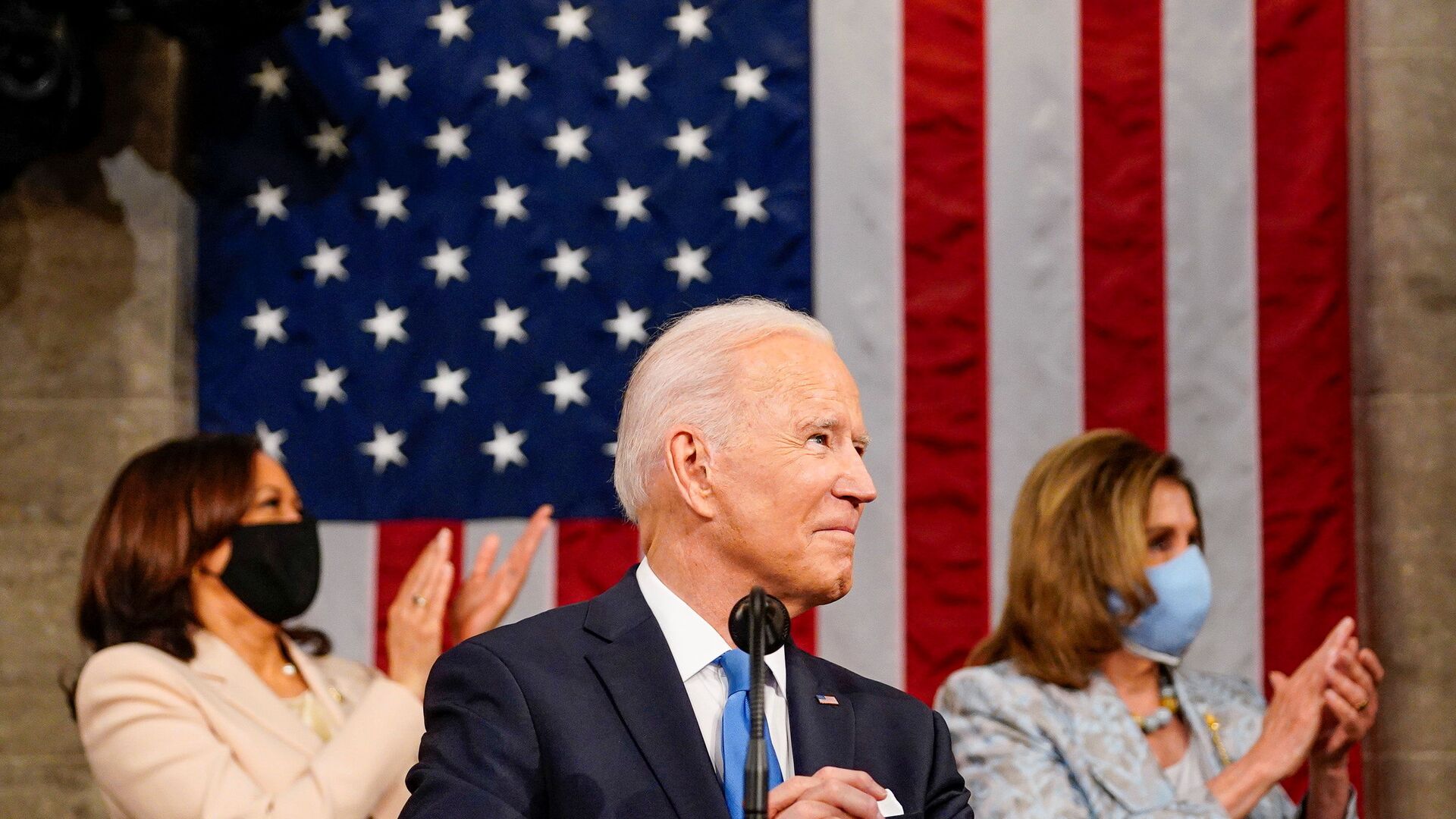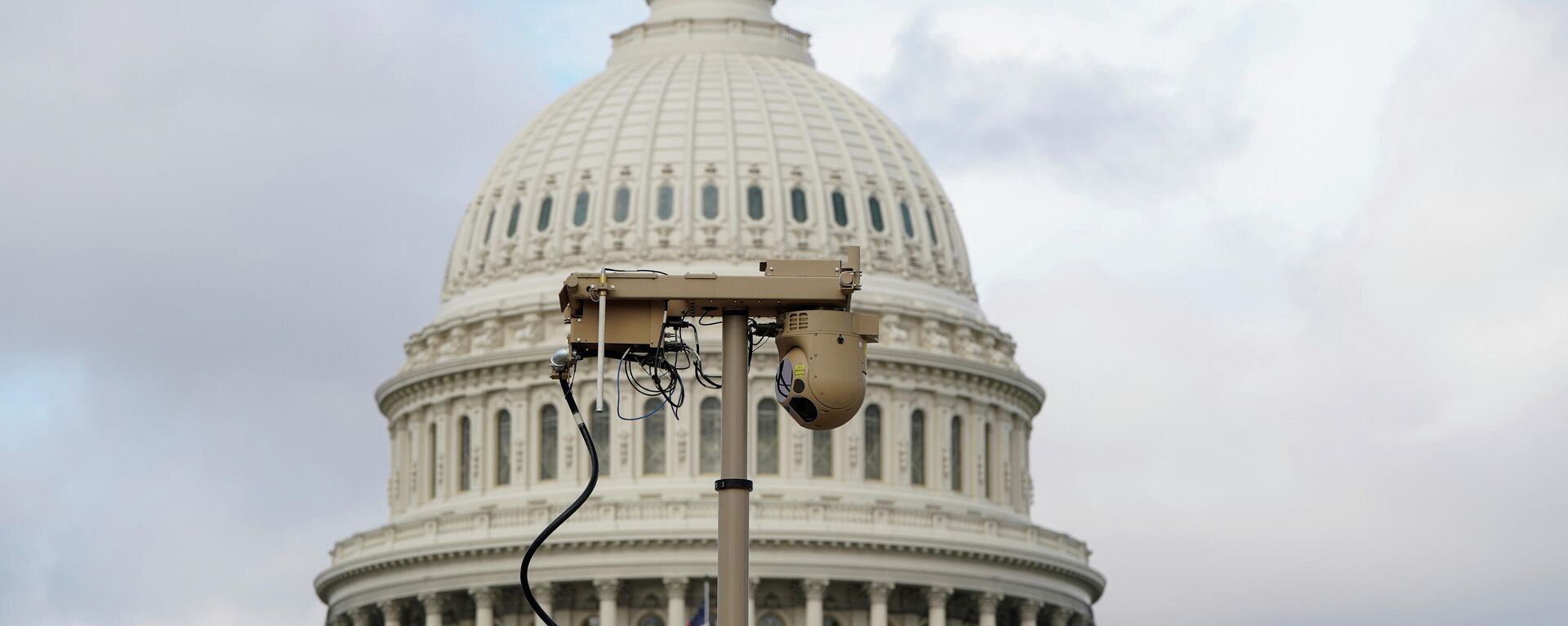Build Back Bankrupt? Dems Wrangle Over $3.5 Trln Spending Bill Despite Debt Limit Close Call
17:08 GMT 08.10.2021 (Updated: 17:22 GMT 08.10.2021)

© REUTERS / POOL
Subscribe
Joe Biden’s signature Build Back Better bill – hailed as one of the most significant federal spending proposals since Franklin Delano Roosevelt’s New Deal, has been praised by progressives and slammed by Republicans. It includes hundreds of billions of dollars in proposed spending on a broad range of social programmes, as well as climate change.
Congressional Democrats and their allies are divided in their willingness to pare down the ten-year, $3.5 trillion Build Back Better agenda, with progressives seeking to maximize permanent spending as conservative party members such as Joe Manchin of West Virginia and Kyrsten Sinema of Arizona push to slash the price tag.
In a series of meetings with Biden on Monday and Tuesday, progressive lawmakers conceded that they might accept the original $3.5 trillion being slimmed down to somewhere in the ballpark of $2.5 to $2.9 trillion.
“If we have to trim a little, then what we would prefer to do is have our priorities and these programmes fully represented but perhaps for a shorter number of years, because I don’t think we can pick and choose between childcare and climate change. I don’t think we can choose between pre-K and housing,” Representative Pramila Jayapal, a member of the Democrats’ congressional progressive caucus, told MSNBC earlier this week.
Ro Khanna, another progressive, suggested that the Democrats should embrace being the party of universal preschool, childcare, paid leave, green jobs and assistance to seniors, suggesting that “if the Republicans want to take those benefits away, we can litigate it in 2024 and beyond.”
The party’s neoliberal and conservative wing is pushing in the other direction, with House Majority Leader Nancy Pelosi sending out a letter Thursday indicating that Democrats were “proceeding with a sharpened pencil” to downsize the bill while promising that Build Back Better would continue to provide “more jobs, cut taxes and lower costs for all.”
Congressional Democrats and President Biden will #BuildBackBetter For The People – with more jobs, cut taxes and lower costs for all. Read my full statement here: https://t.co/c1KsbYdIlL
— Nancy Pelosi (@SpeakerPelosi) October 8, 2021
“Everyone knows there’s going to have to be give and compromise. Just about everyone will be disappointed in some things. But we will get it done,” Senate Speaker Chuck Schumer said Tuesday, commenting on the negotiations.
Joe Manchin, whose vote is essential in a Senate split 50/50 between Republicans, Democrats and Democratic-leaning independents, had previously vowed not to accept spending above $1.5 trillion, but has softened this week, telling reporters Tuesday that he wouldn’t rule out supporting a bill worth up to $2.2 trillion.
Manchin singled out the BBB’s climate provisions – including $150 billion in spending to subsidize utilities companies that increase the use of renewables, as an area ripe for cuts. Other proposed incentives he would prefer to be scrapped include credits for the purchase of electric vehicles, the building of new electric charging stations, and rebates for homeowners who improve insulation in their homes.
Kyrsten Sinema, whose vote is also key, reportedly wants to have her cake and eat it too, seeking to keep the bill’s climate provisions in, as well as the child tax credit expansion, but being unwilling to raise corporate taxes to pay for the spending.
But progressive votes are also important, both in the Senate, where Senator Bernie Sanders could also cast the deciding vote, and the House, where 94 representatives are members of the progressive caucus, and where the party’s neoliberal leaders can afford to lose just three votes for the legislation to pass.
A source told Fortune that Biden is resigned to the fact that spending will drop to a final figure of between $1.9 and $2.3 trillion.
“I want to make sure that we have a package that everyone can agree on,” Biden told reporters during a trip to Michigan on Tuesday. “It’s not going to be $3.5 trillion. It’s going to be less than that,” he said.
Moot Point?
The aggressive wrangling over the Build Back Better bill, which Repubilcans have vowed to oppose, comes amid Thursday’s emergency bipartisan deal to increase the federal debt ceiling by $480 billion, allowing the federal government to pay its bills until early December and avoid a calamitous default on its $28 trillion+ debt.
The debt limit increase, passed by Democrats in the Senate 50-48 and made possible thanks to 11 GOP senators agreeing to drop the 60-vote filibuster rule ordinarily required to pass debt ceiling legislation, came after weeks of warnings from Treasury Secretary Janet Yellen that the United States would go broke by 18 October if the limit was not raised.
The debt ceiling has ballooned by over 2400% since first being introduced in 1917, when a cap of $11.5 billion (equivalent to about $245 billion today) was set. In the 100+ years since, the debt ceiling has been raised more than 100 times, allowing Washington to spend significantly more than it collects in revenues, and enabling the US to fund otherwise prohibitively expensive spending items, such as the Pentagon’s $700 billion+ annual defence budget.



